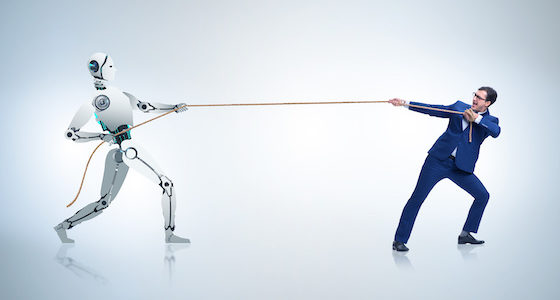Will robots take jobs from humans? Many of us have been worrying about this a lot. The dark factory populated by one man and a dog — the man is there to feed the dog and the dog is there to keep the man from touching the machinery — has been a joke, but it has also been a specter as automation takes on jobs that human beings used to do. Plenty of factories have fewer workers, and robots are stepping in as fry cooks, manicurists, nurses, and therapists.
A recent survey found that nearly half of Americans worried about losing their jobs to robots. The World Economic Forum predicted that 85 million jobs would be lost to automation in this decade (they also said that 97 million jobs would develop, but that wouldn’t necessarily help the 85 million who lost the jobs they were qualified to do). Predictions about automation taking over jobs tends to focus not on whether this will happen, but on which jobs are most obviously ripe for takeover.
The thing is, this question has been troubling people for so long that there is now actual data to answer it. Farhad Manjoo has the answer: the people are winning.
No job shortage
For one, thing, we can see that there is no job shortage. Instead, there is a labor shortage. Automation is on the rise, robots are being bought and sold in ever increasing numbers, but employers are having to court human workers with signing bonuses and higher wages.
And many of the jobs most squarely in the sights of those who want robots to take on more human tasks are still being done by humans because robots just aren’t good enough yet. Robot truck drivers have been a threat to human truck drivers for years now, but trucks can’t actually operate without human beings yet. In fact, robot fry cooks, manicurists, and therapists aren’t actually able to take over for human yet, either.
AI at the moment is a lot more hat than cattle.
Is there disruption?
This is not to say that there won’t be disruption.
Mango quotes Curtis Langlotz, who said, “Will A.I. replace radiologists?” is “the wrong question.” Here’s the truth: “Radiologists who use A.I. will replace radiologists who don’t.”
People will need to be able to work with automation. Experts estimate that about one third of the tasks in most jobs can be automated. Human workers need to be able to get those tasks done by robots or AI, and they need to be able to learn enough new tasks to fill up that work time. Otherwise, the total number of human workers will shrink.
It hasn’t happened yet, though, and it may not happen at all. If it were a certainty, we’d be seeing signs by now.
For now, humans still have the upper hand when it comes to service and support for Indramat systems.
When you need assistance, call us for immediate help.
